Best B2B eCommerce Platform
Best b2b ecommerce platform software are salesforce, Shopify, big commerce, virtocommerce, pepperi, and many others. B2b ecommerce platform software aids in the growth of customers, scalability, efficiency, sales, and brand exposure.



No Cost Personal Advisor
List of 20 Best B2B ECommerce Platform
Category Champions | 2024
Platform by BigCommerce Pty. Ltd.
Bigcommerce is the most trusted and highly recommended b2b e-commerce software. Many top e-commerce businesses all over the world use it. This software supports and equips fast-growing online businesses to achieve high revenues. Bigcommerce software uses cloud technology to provide a range of useful features that help store owners manage and optimize their stores efficiently. Read BigCommerce Reviews
Explore various BigCommerce features, compare the pricing plans, and unlock the potential of seamless operations by selecting the right software for your business.
Features
View all BigCommerce Features- Returns Management
- POS invoicing
- Email Marketing / SMS Marketing
- Multi-Store Management
- Payment Gateway Integration
- Catalog Management
- Templates
- Channel Management
Pricing
BigCommerce Caters to
- StartUps
- SMBs
- Agencies
- Enterprises
Category Champions | 2024
#1 CRM & support solution for growing businesses
Salesforce uses cloud technology to provide a smarter and faster digital b2b e-commerce platform through which brands can deliver a more personalized customer experience. The commerce platform provided by Salesforce allows brands to launch and maintain multiple e-commerce sites easily. Also, it enables store owners to stay connected with consumers anytime from anywhere. Read Salesforce Reviews
Explore various Salesforce features, compare the pricing plans, and unlock the potential of seamless operations by selecting the right software for your business.
Features
View all Salesforce Features- Knowledge Base
- Customer Support
- Analytics
- TMF API Enhancements
- Einstein Copilot
- Automotive Data Bundle
- Prompt Builder
- Automotive Calculated Insights
Pricing
Salesforce Caters to
- StartUps
- SMBs
- Agencies
- Enterprises
Category Champions | 2024
Platform by Shopify Inc.
Shopify offers a complete cloud-based b2b e-commerce solution for businesses of all sizes from various verticals. The eCommerce platform provided by Shopify enables business owners to create, manage and optimize online stores effectively. Businesses can choose suitable plans for Shopify that suit their online business and start growing. Read Shopify Reviews
Explore various Shopify features, compare the pricing plans, and unlock the potential of seamless operations by selecting the right software for your business.
Features
View all Shopify Features- Hosting
- Security
- Mobile Friendly Store
- Customer Support
- Inventory Management
- DIY Store
- Multi Currency
- Orders Management
Pricing
Basic Shopify
$ 29
Per Month
Pro Shopify
$ 79
Per Month
Advanced Shopify
$ 229
Per Month
Shopify Caters to
- StartUps
- SMBs
- Agencies
- Enterprises
Contenders | 2024
The #1 Cloud ERP solution
Oracle NetSuite is the best b2b e-commerce platform for business owners keen on generating great online shopping experiences. With such a high shopping experience, store owners can easily drive more sales and increase revenue. More importantly, the platform offers various tools and features, allowing brands to grow customer loyalty. Read Oracle NetSuite Reviews
Explore various Oracle NetSuite features, compare the pricing plans, and unlock the potential of seamless operations by selecting the right software for your business.
Features
View all Oracle NetSuite Features- Accounts Receivable
- FDA Compliance
- Bills of Material
- ERP
- Spend Management
- Invoicing
- Fund accounting
- Sales Reports
Oracle NetSuite Caters to
- StartUps
- SMBs
- Agencies
- Enterprises
Contenders | 2024
Platform by WooCommerce
WooCommerce offers an excellent open-source b2b commerce solution for merchants and retailers to build a successful online business. The e-commerce platform of WooCommerce is highly flexible and can be easily customizable according to business requirements. Small-level to mid-sized e-commerce businesses can benefit a lot by using this software. Read WooCommerce Reviews
Explore various WooCommerce features, compare the pricing plans, and unlock the potential of seamless operations by selecting the right software for your business.
Features
View all WooCommerce Features- Orders Management
- Vendor Management
- Order Status / Tracking and History
- Inventory Management
- Social Network Integration
- Promotions Management
- Store Customization
- Customer Support
WooCommerce Caters to
- StartUps
- SMBs
- Agencies
- Enterprises
Emergents | 2024
Platform by Pepperi
Pepperi is one of the best b2b platforms for businesses looking for a unified commerce solution for managing their b2b sales online. The all-in-one e-commerce platform Pepperi provides accelerates business growth in the virtual world and more transparency. E-commerce businesses can easily exceed the expectations of online customers by using this Pepperi software. Learn more about Pepperi
Explore various Pepperi features, compare the pricing plans, and unlock the potential of seamless operations by selecting the right software for your business.
Features
View all Pepperi Features- Lead Generation
- Opportunity Management
- Workflow Management
- Contract Management
- Marketing Automation
- Sales Dashboards & Reports
- Access Monitoring
- CRM & Sales Reports
Pricing
Pro
$ 48
User/Month
Corporate
$ 78
User/Month
Ultimate
$ 128
User/Month
Pepperi Caters to
- StartUps
- SMBs
- Agencies
- Enterprises
Category Champions | 2024
Marketplace software to create multi vendor websit
CS-Cart Multi-Vendor is a popular b2b commerce platform that allows e-commerce businesses to create a marketplace allowing independent vendors to sell their products. The Multi-vendor platform of CS-Cart uses built-in CMS and a single storefront for creating a marketplace. E-commerce Startups looking to expand their marketplace can use this Multi-Vendor software. Read CS-Cart Multi-Vendor Reviews
Explore various CS-Cart Multi-Vendor features, compare the pricing plans, and unlock the potential of seamless operations by selecting the right software for your business.
- Mobile App
- Shipping Management
- Returns Management
- Order Management
- Discounts & Coupons
- SEO and Online Marketing
- Customer Support
- Security
CS-Cart Multi-Vendor Caters to
- StartUps
- SMBs
- Agencies
- Enterprises
Emergents | 2024
Platform by OpenCart
OpenCart is the most affordable b2b online platform offering attractive features, including payment and shipping integration to eCommerce businesses. This online e-commerce platform is the first choice for all-size businesses looking to build SEO-friendly stores. Being an open-source platform, users don't need to pay, and it is highly customizable. Read OpenCart Reviews
Explore various OpenCart features, compare the pricing plans, and unlock the potential of seamless operations by selecting the right software for your business.
Features
View all OpenCart Features- Promotions Management
- Customer Support
- Shopping Cart
- Orders Management
- Security
- Channel Management
- Catalog Management
- Content Management System
OpenCart Caters to
- StartUps
- SMBs
- Agencies
- Enterprises
Contenders | 2024
Platform by Magento Inc.
Magento is a forefront b2b e-commerce system that makes building and managing e-commerce websites easy. It is designed to meet enterprise-grade e-commerce businesses' needs and achieve endless growth. The platform offers robust features and tools enabling businesses to be innovative in their commerce operation and increase revenues. Read Magento Reviews
Explore various Magento features, compare the pricing plans, and unlock the potential of seamless operations by selecting the right software for your business.
Features
View all Magento Features- Facebook Store
- Integration with marketplaces
- Customer Support
- Catalog Management
- Store Customization
- Email Marketing / SMS Marketing
- Discounts & Coupons
- Orders Management
Magento Caters to
- StartUps
- SMBs
- Agencies
- Enterprises
Contenders | 2024
Platform by PrestaShop
PrestaShop is an easy-to-use e-commerce software with an intuitive interface. E-commerce businesses can create and manage their online catalogues easily and improve sales with the b2b e-commerce software solution of this software. The appealing features and handy tools of this PrestaShop make it the most rated and highly preferred software for eCommerce businesses. Read PrestaShop Reviews
Explore various PrestaShop features, compare the pricing plans, and unlock the potential of seamless operations by selecting the right software for your business.
Features
View all PrestaShop Features- Shopping Cart
- Vendor Management
- Returns Management
- Inventory Management
- Content Management System
- POS invoicing
- Promotions Management
- Security
Pricing
Start
$ 29
Per Month
PrestaShop Caters to
- StartUps
- SMBs
- Agencies
- Enterprises
Emergents | 2024
Platform by 3dcart
One of the top b2b platforms in the current market is 3dcart. It is powerful and designed to support all-size businesses to build and manage their eCommerce store efficiently. This feature-rich eCommerce software allows companies to manage their inventories and supply chain processes easily. Moreover, it helps businesses to adhere to market trends. Read 3dcart Reviews
Explore various 3dcart features, compare the pricing plans, and unlock the potential of seamless operations by selecting the right software for your business.
Features
View all 3dcart Features- Catalog Management
- Promotions Management
- Tax Management
- Email Marketing / SMS Marketing
- Credit Card Processing
- Abandoned Cart Saver
- Channel Management
- Shopping Cart
Pricing
Basic
$ 29
Per Month
Plus
$ 79
Per Month
Pro
$ 229
Per Month
3dcart Caters to
- StartUps
- SMBs
- Agencies
- Enterprises
Emergents | 2024
Platform by Insite Software
This b2b commerce software, InsiteCommerce, helps retailers and manufacturers increase revenues by optimizing their online stores. It offers end-to-end solutions to companies for effective product distribution cost-effectively. Intuitive interface, Built-in Content management system and easy-to-integrate features seem to be the pick of the features provided by this InsiteCommerce. Learn more about InsiteCommerce
Explore various InsiteCommerce features, compare the pricing plans, and unlock the potential of seamless operations by selecting the right software for your business.
Features
View all InsiteCommerce Features- Email Marketing
- SEO Management
- Returns Management
- Inventory Management
- CRM
- Multi-Store Management
InsiteCommerce Caters to
- StartUps
- SMBs
- Agencies
- Enterprises
Emergents | 2024
Platform by TrueCommerce Inc
Netalogue is a reliable top b2b e-commerce platform designed to meet the needs of high-demanding commerce businesses. Mostly, wholesalers, manufacturers and distributors who deal with large products use this e-commerce software. Appealing features like SEO, multichannel management and effective promotions are the key to making this software popular. Learn more about Netalogue
Explore various Netalogue features, compare the pricing plans, and unlock the potential of seamless operations by selecting the right software for your business.
Features
View all Netalogue Features- Email Marketing Integration
- Configuration Management
- Billing & Invoicing
- Document Management
- Duplicate Detection
- Multi-Store Management
- Promotions Management
- Payment Processing
Netalogue Caters to
- StartUps
- SMBs
- Agencies
- Enterprises
Emergents | 2024
Platform by NuORDER Inc
NuOrder is a leading b2b e-commerce platform designed to satisfy a wholesale business's current and future needs. The software is easy to use and comes with attractive features. The range of tools and services this eCommerce software provides helps businesses deliver a better on-demand shopping experience to their loyal customers. Learn more about NuOrder
Explore various NuOrder features, compare the pricing plans, and unlock the potential of seamless operations by selecting the right software for your business.
Features
View all NuOrder Features- Order Management
- Store Customization
- Channel Management
- Shopping Cart
- Email Marketing / SMS Marketing
- Orders Management
- Catalog Management
- POS invoicing
NuOrder Caters to
- StartUps
- SMBs
- Agencies
- Enterprises
Emergents | 2024
Get Fast to Market. First To Customers.
Ewiz commerce is cloud-based AI-powered b2c and b2b e-commerce software that helps businesses to sell their products online and gain digital success. Companies looking to digitize their operations quickly and scale it anytime can use this software. Unlike other software, this ewiz commerce delivers a future-ready commerce platform. Learn more about ewiz commerce
Explore various ewiz commerce features, compare the pricing plans, and unlock the potential of seamless operations by selecting the right software for your business.
Features
View all ewiz commerce Features- Inventory Management
- Content Management
- Reporting
- Faceted Search / Filtering
- Customer Accounts
- Email Marketing Integration
- Cross Selling Functionality
- eCommerce
ewiz commerce Caters to
- StartUps
- SMBs
- Agencies
- Enterprises
Emergents | 2024
Award-winning open source B2B eCommerce platform
OroCommerce gives the best b2b e-commerce solution for manufacturers, distributors and enterprise-grade businesses. It allows companies to set up their multichannel online store and grow. Being an open-source platform, setting up a virtual store costs nothing. However, the platform has handy features and tools using which store owners can optimize their store operations. Read OroCommerce Reviews
Explore various OroCommerce features, compare the pricing plans, and unlock the potential of seamless operations by selecting the right software for your business.
Features
View all OroCommerce Features- Shopping Cart
- Orders Management
- Customer Account Profiles
- Product configurator
- Promotions Management
- Catalog Management
- Multi-Store Management
- Channel Management
OroCommerce Caters to
- StartUps
- SMBs
- Agencies
- Enterprises
Emergents | 2024
Platform by commercetools
Commercetools is one of the world's best b2b platforms offering adaptive solutions to all business models involved in online trading. Commercetools wide open online trading opportunities for stores to gain digital success and improve their customer experience with the visually-appealing eCommerce solution. The tool uses cloud technology to provide solutions for all business models. Learn more about commercetools
Explore various commercetools features, compare the pricing plans, and unlock the potential of seamless operations by selecting the right software for your business.
Features
View all commercetools Features- Mobile Access
- Data Security
- Email Marketing
- Channel Management
- Reviews Management
- Promotions Management
- SEO Management
- Returns Management
commercetools Caters to
- StartUps
- SMBs
- Agencies
- Enterprises
Contenders | 2024
a smarter way to create your online store
Shopaccino provides an all-in-one b2b commerce platform that suits well for all sizes of businesses from various verticals. Creating and managing online stores efficiently is a piece of cake for companies with this e-commerce software. This store's enriched features help businesses enhance their online presence among potential audiences. Read Shopaccino Reviews
Explore various Shopaccino features, compare the pricing plans, and unlock the potential of seamless operations by selecting the right software for your business.
Features
View all Shopaccino Features- Offer & Offer Popup
- Catalog Management
- Customer Support
- Design Template Gallery
- External Apps & In-Built Features
- Mobile Friendly Store
- Facebook Store
- Secure Sockets Layer (SSL)
Pricing
Starter
$ 14
Per Month
Basic
$ 28
Per Month
Professional
$ 42
Per Month
Shopaccino Caters to
- StartUps
- SMBs
- Agencies
- Enterprises
Emergents | 2024
#1 Open-Source Marketplace Management Platform for
OroMarketplace is a power-packed b2b online platform designed to help businesses trade goods and services in large numbers. The platform provided by this software overcomes all those obstacles for enterprises. It is the perfect software for strengthening the vendor relationship and increasing the CX of companies involved in trading activities. Learn more about OroMarketplace
Explore various OroMarketplace features, compare the pricing plans, and unlock the potential of seamless operations by selecting the right software for your business.
Features
View all OroMarketplace Features- Shopping Cart
- SEO Management
- Order Management
- Catalog Management
- Payment Processing
- Returns Management
- Product Ratings / Reviews
- Vendor Portal
OroMarketplace Caters to
- StartUps
- SMBs
- Agencies
- Enterprises
Emergents | 2024
Sana delivers B2B e-commerce solutions
Sana Commerce is a reliable and highly scalable b2b commerce software. Many trading companies use it to integrate all their services to deliver a better digital experience to their customers. The tool's comprehensive solution lets store owners stay updated with real-time trading information and build strong relationships with consumers. Learn more about Sana Commerce
Explore various Sana Commerce features, compare the pricing plans, and unlock the potential of seamless operations by selecting the right software for your business.
Features
View all Sana Commerce Features- Social Network Integration
- Bulk Product Upload
- Integration with marketplaces
- Inventory Management
- Hosting
- Security
- Multi Currency
- International Payment Acceptance
Sana Commerce Caters to
- StartUps
- SMBs
- Agencies
- Enterprises
Until 30th Apr 2024

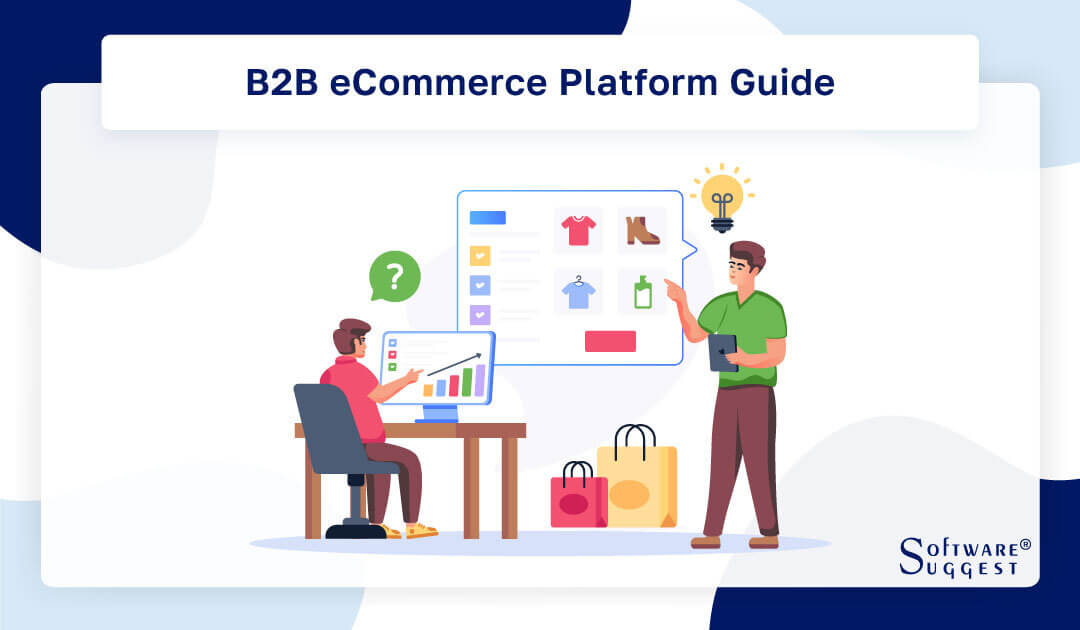
Just as campaign management software revolutionized the way marketing campaigns are executed, businesses are now on the hunt for the ideal solution to enhance their B2B eCommerce endeavors. In the intricate realm of B2B transactions, where efficient handling of bulk orders and diverse client needs is paramount, a suite of sophisticated marketing tools is essential.
Much like campaign management systems, which streamline marketing efforts, the best B2B eCommerce platform is a game-changer for online business interactions. With the complexities of B2B transactions and the need for seamless interactions, relying on disjointed tools can lead to errors and inefficiencies.
To address these challenges, businesses are adopting comprehensive B2B eCommerce platforms. These platforms encompass an array of features, including order management, inventory tracking, customer segmentation, and robust analytics.
By embracing the ultimate B2B eCommerce platform, businesses can optimize their processes, enhance collaboration, and elevate customer experiences. This unified solution empowers enterprises to thrive in the competitive B2B landscape by centralizing all eCommerce activities in one efficient center.
What are B2B eCommerce Platforms?
B2B eCommerce platforms help create streamlined procurement processes, improved customer interactions, and enhanced sales workflows. They offer a range of functionalities, including catalog management, order processing, customer segmentation, and integration with ERP software.
Businesses stand to gain numerous benefits from adopting best B2B platforms. By centralizing B2B operations onto a unified platform, companies can foster greater operational synergy and empower their teams to work cohesively and effectively.
How Does B2B eCommerce Platform Work?
B2B transactions have evolved to encompass a digital landscape where businesses interact and trade online. As the complexity of B2B interactions grows, enterprises are recognizing the need for streamlined and efficient platforms to facilitate these transactions. B2B eCommerce platforms offer a comprehensive solution to manage the intricacies of business-to-business transactions.
In traditional B2B operations, the process of sourcing, negotiating, and purchasing goods or services involves a series of manual steps, often leading to inefficiencies, errors, and delays. Email exchanges, phone calls, and physical documentation created a fragmented environment that hindered smooth operations. However, as technology advanced, businesses started adopting B2B eCommerce platforms to centralize and optimize their operations.
These platforms provide a cohesive digital ecosystem where businesses can discover, communicate, negotiate, and finalize transactions with their partners. From a user perspective, B2B eCommerce platforms function much like consumer-oriented online marketplaces but with specialized features tailored to the unique needs of businesses.
Who Uses B2B eCommerce Software?
B2B eCommerce software serves as a powerful tool for enhancing various facets of online business-to-business transactions. Let’s explore the key entities that leverage this software to streamline and optimize their B2B operations.
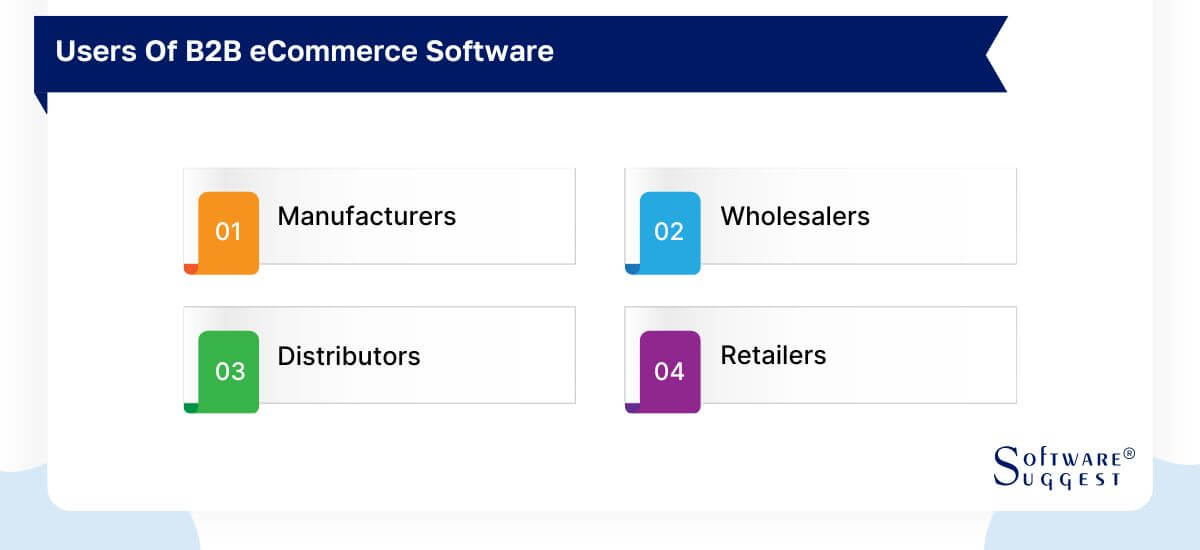
-
Manufacturers
Manufacturers often employ B2B eCommerce software to efficiently showcase their products and offerings to wholesalers, distributors, and retailers. This software enables manufacturers to create comprehensive digital product catalogs, display product specifications, and manage inventory levels in real time. By doing so, manufacturers can provide accurate and up-to-date information to their business partners, leading to smoother order placements and fulfillment processes.
-
Wholesalers
B2B eCommerce software proves invaluable for multiple brands and wholesalers looking to enhance their ordering processes and expand their customer base. Wholesalers can utilize this software to provide a user-friendly platform for retailers and other buyers to browse through their product offerings, place bulk orders, and monitor order statuses. Additionally, wholesalers can leverage eCommerce features like personalized/custom pricing and bulk discounts to cater to the customer specific pricing needs of their B2B shoppers.
-
Distributors
Distributors play a pivotal role in bridging the gap between manufacturers and retailers. B2B eCommerce software empowers distributors to manage complex supply chains effectively. They can use the software to track inventory levels across various warehouses, manage shipments, and automate order processing. By offering seamless integration with manufacturers and retailers, distributors can ensure that products flow efficiently through the supply chain.
-
Retailers
For retailers, B2B eCommerce software streamlines the procurement process, allowing them to source products from manufacturers and wholesalers with ease. Retailers can access detailed product information, stock availability, and pricing through the software. This enables them to make informed purchasing decisions, manage inventory effectively, and offer a wider range of products to their customers. The software's order management capabilities also assist retailers in fulfilling customer orders promptly and accurately.
B2B eCommerce software serves as a fundamental tool for manufacturers, wholesalers, distributors, and retailers to optimize their business operations. It facilitates smoother interactions, simplifies ordering processes, and improves overall supply chain efficiency across the B2B landscape.
Benefits of Best B2B eCommerce Platforms
In today's competitive business landscape, B2B eCommerce platforms have emerged as essential tools for companies seeking to expand their reach and optimize their sales strategies.
There are many platforms, including the top 20 eCommerce software solutions offering a range of advantages that can significantly impact a business's growth and success. Whether a company is just starting out or is already an established player in the market, the benefits of utilizing the best B2B eCommerce platforms are undeniable.
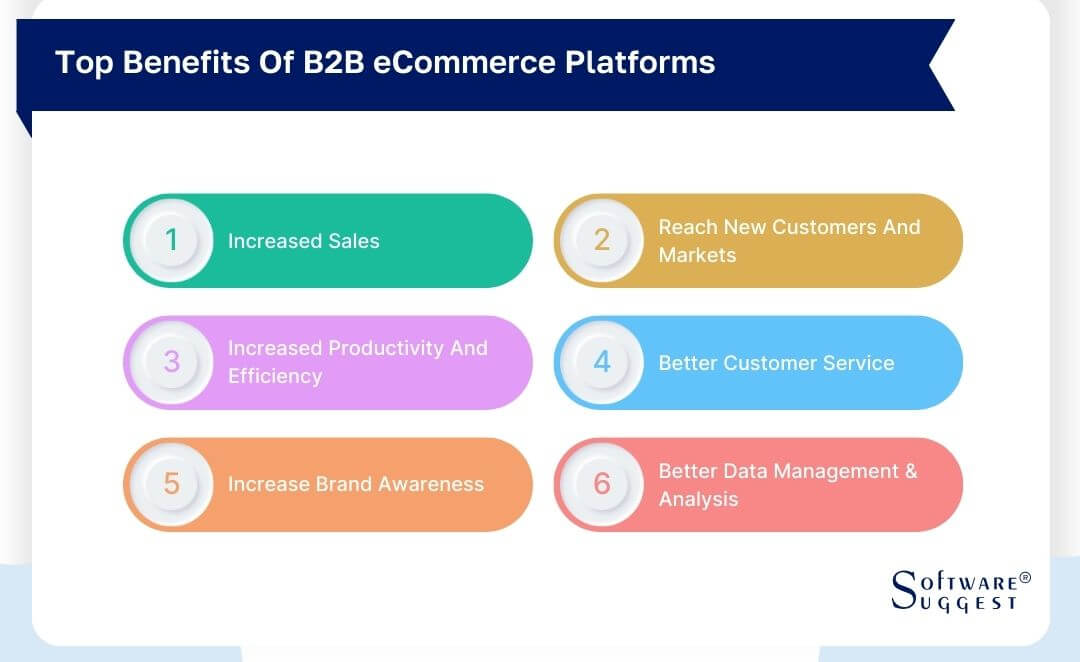
-
Increased Sales
Efficient B2B eCommerce platforms provide businesses with the opportunity to showcase their products and services to a broader audience. This enhanced online presence leads to increased visibility, which in turn drives higher sales figures. The seamless ordering and purchasing process offered by these platforms contribute to smoother transactions, ultimately boosting revenue generation.
-
Reach New Customers and Markets
Expanding a business's customer base is a constant goal, and B2B eCommerce platforms play a pivotal role in achieving this. By breaking down geographical barriers and offering easy access to products and services, these platforms empower companies to reach new customers in untapped markets. This expansion opens up opportunities for diversification and growth.
-
Better Customer Service
B2B eCommerce platforms often come equipped with customer service features that enhance the overall buying experience. Quick response times, personalized communication, and easy access to product information contribute to better customer satisfaction. This positive interaction fosters stronger client relationships and encourages repeat business.
-
Increased Productivity and Efficiency
Automation is a key advantage of the best B2B eCommerce platforms. By automating order processing, inventory management, and other routine tasks, businesses can allocate resources more efficiently. This newfound productivity translates into cost savings and frees up personnel to focus on strategic initiatives.
-
Increase Brand Awareness
A strong brand presence is essential for business success, and B2B eCommerce platforms contribute significantly to brand building. Through consistent branding elements, rich product presentations, and interactive content, these platforms provide a space for businesses to convey their brand identity effectively. This increased brand awareness fosters credibility and customer trust.
-
Better Data Management and Analysis
Data is a valuable resource for decision-making, and B2B eCommerce platforms excel in collecting and analyzing relevant customer data. Businesses can gain insights into customer preferences, purchasing patterns, and market trends. With this information at hand, companies can make informed choices, tailor their offerings, and refine their strategies for optimal outcomes.
The benefits of the best B2B eCommerce platforms extend far beyond just facilitating transactions. From driving sales growth to enhancing customer engagement and refining business strategies, these platforms serve as invaluable tools for modern businesses striving to excel in a competitive marketplace.
Key Features of B2B eCommerce Platforms
Modern B2B online platforms offer a range of robust features tailored to meet the unique needs of businesses engaging in wholesale transactions. These platforms serve as dynamic solutions to enhance B2B transactions and streamline operations. Here are some essential features of B2B eCommerce platforms:
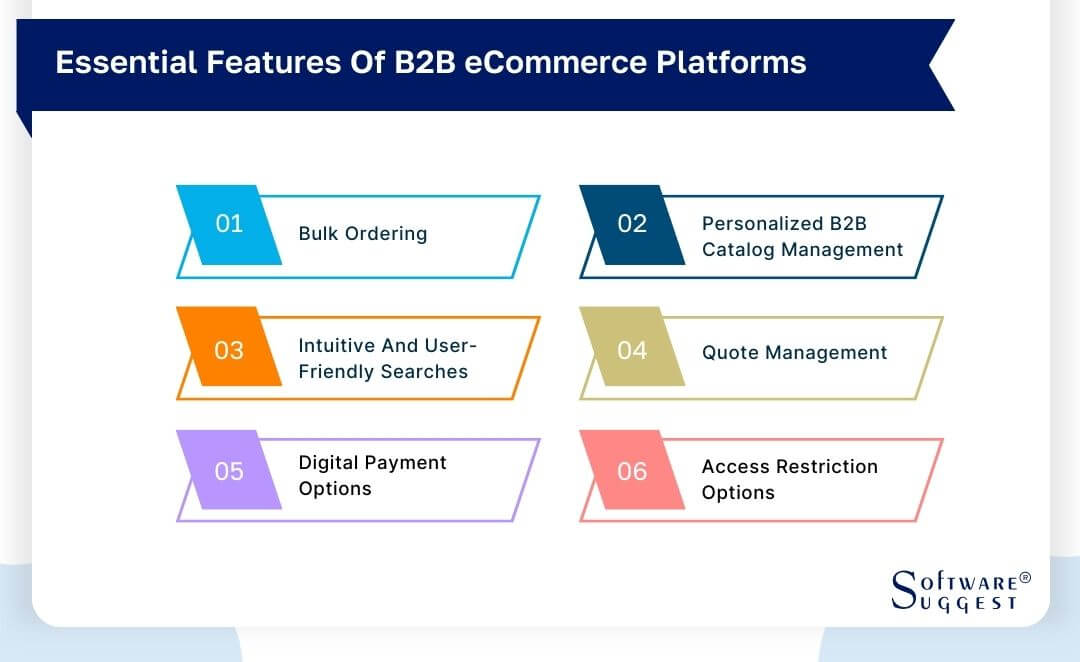
-
Bulk Ordering
B2B eCommerce platforms excel in facilitating bulk ordering, a crucial requirement for wholesale transactions. The platforms provide an intuitive interface for buyers to add large quantities of items to their carts effortlessly. This feature is complemented by quick order forms and the ability to upload bulk order lists, ensuring a seamless and time-saving ordering process for buyers.
-
Personalized B2B Catalog Management
Customization lies at the heart of B2B eCommerce, and robust catalog management is pivotal. B2B eCommerce platforms enable businesses to curate personalized catalogs for different buyer segments. Tailoring product assortments, pricing, and promotions based on buyer profiles ensures a tailored shopping experience that resonates with each customer.
-
Intuitive and User-friendly Searches
In the complex world of B2B transactions, efficient search functionality is paramount. B2B eCommerce platforms offer advanced search capabilities, including filtering by various attributes such as SKU, specifications, and categories. The intuitive search experience ensures that buyers quickly locate the products they need, thereby expediting the purchasing process.
-
Quote Management
Negotiating quotes is an integral part of B2B transactions. B2B commerce software empower buyers to request quotes directly through the platform. Sellers can respond with tailored quotes, and the negotiation process can be managed seamlessly within the same platform. This streamlines communication and simplifies the negotiation workflow for both parties.
-
Digital Payment Options
B2B eCommerce platforms facilitate smooth and secure digital payment methods, which are crucial for swift transactions. These platforms support various payment gateways, multiple currencies, credit terms, and invoicing options. Buyers can select the payment method that aligns with their preferences, while sellers can efficiently manage payments and invoices
-
Access Restriction Options
Privacy and control over product visibility are paramount in B2B transactions. B2B eCommerce platforms provide sophisticated access restriction features. Sellers can set up tiered access, ensuring that specific products, pricing, and information are visible only to authorized buyers. This feature enhances security, allows for tailored pricing agreements, and maintains confidentiality.
B2B eCommerce platforms are the driving force behind efficient wholesale operations, offering easy bulk ordering, personalized catalog management, intuitive search options, streamlined quote negotiations, secure digital payments, and controlled access for authorized buyers. These platforms are the backbone of successful wholesale transactions, boosting efficiency and tailor-fitting the experience for each customer.
How to Choose the Right B2B eCommerce Solution?
Selecting the perfect B2B eCommerce platform to power your online operations is paramount for sustained business growth and success. With a plethora of options available, navigating through the various offerings can be a challenging endeavor. Delve into the following key considerations to ensure you make an informed decision that aligns seamlessly with your business goals.
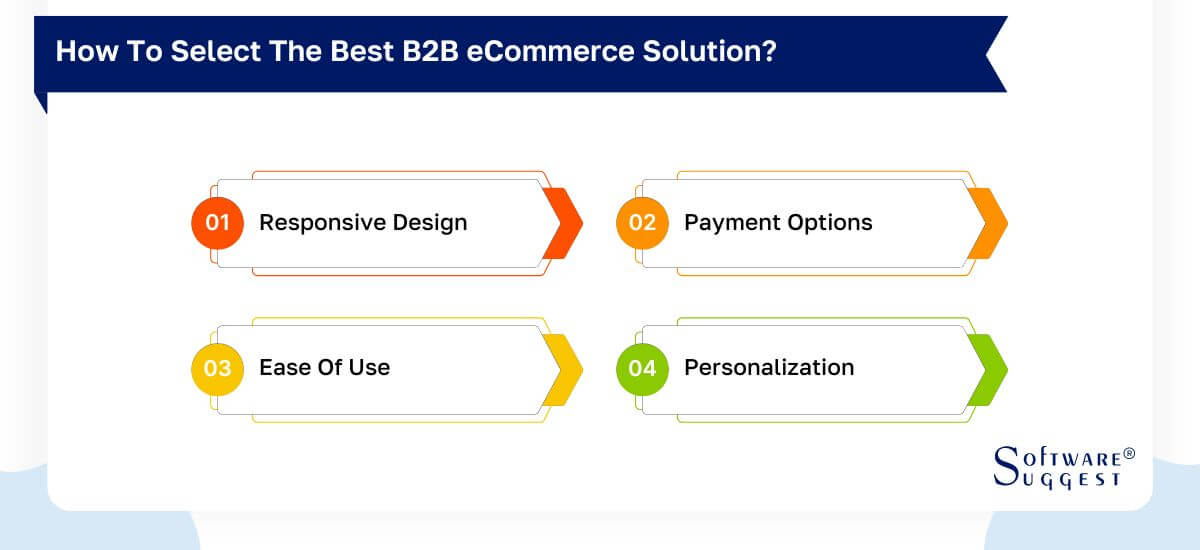
-
Responsive Design
Catering to a diverse range of clients who access your B2B platform from different devices is essential. Prioritize a B2B eCommerce solution that boasts a responsive design. This feature ensures that your platform functions seamlessly across various screen sizes, delivering an optimal user experience regardless of whether your clients are browsing from desktops, laptops, tablets, or smartphones.
-
Payment Options
The flexibility of payment methods is a crucial factor in enhancing customer satisfaction and facilitating smooth transactions. Evaluate B2B eCommerce solutions based on their ability to support multiple payment options, such as credit/debit cards, electronic funds transfers, purchase orders, and invoicing. This diversity in payment methods accommodates the preferences of your varied clientele, enhancing their convenience and encouraging repeat business.
-
Ease of Use
A user-friendly B2B eCommerce platform streamlines operations for both your team and your clients. Seek a solution that boasts an intuitive interface and straightforward navigation, allowing users to browse products, place orders, track shipments, and manage their accounts easily. A solution that requires minimal training for users to grasp its functionalities ensures a seamless onboarding process and reduces the risk of abandoned carts due to complexity.
-
Personalization
Recognizing the unique needs of each B2B client and tailoring the online shopping experience accordingly can significantly boost engagement and sales. When evaluating B2B eCommerce solutions, prioritize those that offer robust personalization capabilities. This could involve segmenting clients based on industry, order history, or purchasing behavior and then presenting tailored product recommendations, pricing, and promotions to cater to their specific requirements.
By carefully considering these factors, you can select a B2B eCommerce solution that aligns seamlessly with your business goals and optimizes your online store operations for success.
Top 5 B2B eCommerce Platforms Comparison
|
Name
|
Free Trial
|
Demo
|
Pricing
|
|---|---|---|---|
|
14 Days |
Yes |
Starting price at $39/month |
|
|
15 Days |
Yes |
Starting price at $39/month |
|
|
30 Days |
Yes |
Custom Pricing |
|
|
14 Days |
Yes |
Starting price at $500/month |
|
|
14 Days |
Yes |
Custom Pricing |
Within the realm of B2B eCommerce, building a successful eCommerce platform proves to be a big deal. Thus, the selection of the appropriate B2B platform takes on paramount importance as it strives to establish a strong online presence. To assist you in making an informed decision, here's a comparison of five prominent best B2B platforms:
1. Shopify
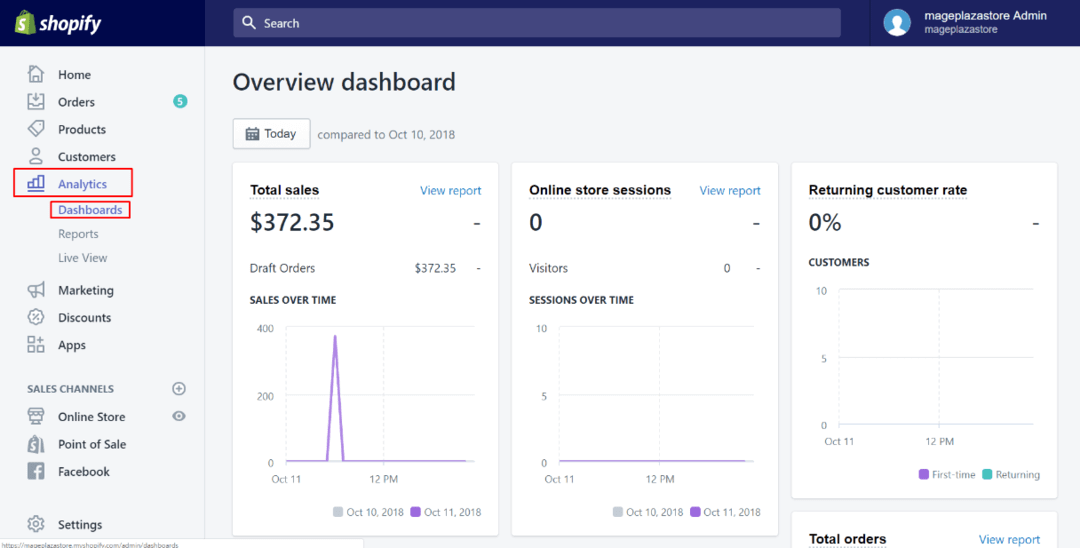
Shopify, top B2B platform offers a comprehensive suite of features tailored for businesses seeking efficient online selling solutions. With its user-friendly interface and customizable templates, Shopify B2B enables easy setup and management of your B2B eCommerce site.
- Creation and management of wholesale accounts.
- Bulk ordering
- Ability to import/export using CSV.
- Product search and filtering options.
- Managing your store becomes effortless due to the intuitive user interface.
- Extend functionality through a robust app ecosystem.
- Scalability caters to businesses of varying sizes.
- Third-party payment gateways incur transaction fees.
- Access to advanced features might necessitate additional app installations.
Pricing
- Basic Shopify: $39/month
- Advanced Shopify: $399/month
- ShopifyPlus - Starting at $2,000/month
2. BigCommerce
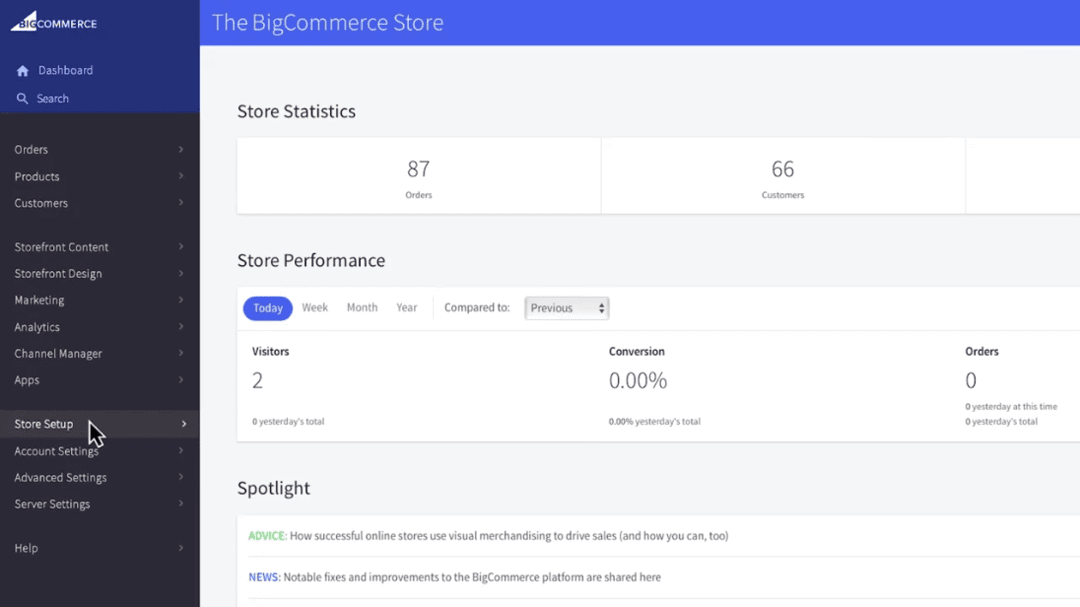
BigCommerce B2B is designed to provide businesses with the tools they need to enhance their B2B eCommerce operations. BigCommerce is also known as one of the best multi channel eCommerce Software. It offers a range of features to create a seamless and efficient online buying experience for wholesale customers.
- Personalized price catalogs
- Shipping and fulfillment preferences
- Integration with ERP and CRM systems
- Data analytics and comprehensive reporting
- Empowered with potent integrated features, reducing reliance on numerous apps
- Adaptable and well-suited for businesses nurturing aspirations of substantial expansion
- Diverse assortment of responsive templates to choose from
- Beginners might experience a somewhat harder time learning.
- Some plans have extra charges for transactions.
Pricing
- Standard: $39/month
- Plus: $105/month
- Pro: $399/month
3. OroCommerce
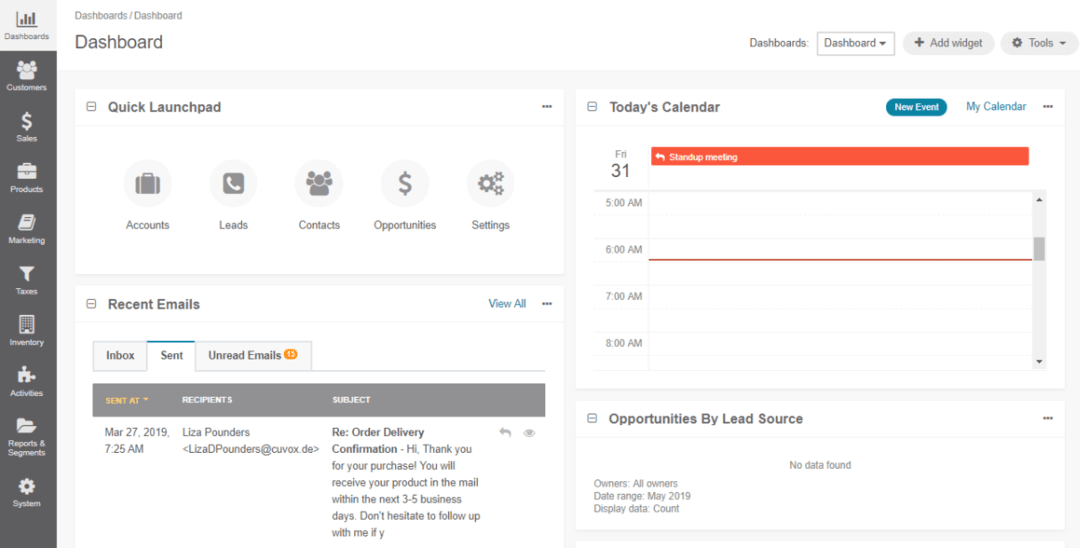
OroCommerce is a specialized B2B eCommerce platform that focuses on the unique needs of B2B businesses. Its robust feature set aims to provide a comprehensive solution for businesses engaged in complex B2B transactions.
- Catalog management capabilities
- Customizable price lists and quotes
- Integration of RFQ (Request for Quote) functionality
- Support for multiple websites and languages
- Tailored precisely to suit B2B demands
- Emphasis on scalability and optimal performance
- Possesses a versatile architecture allowing for easy customization
- Limited array of third-party integrations available
- Potential to overwhelm smaller businesses due to its breadth
Pricing
- For details regarding pricing, please get in touch with OroCommerce.
4. Pepperi
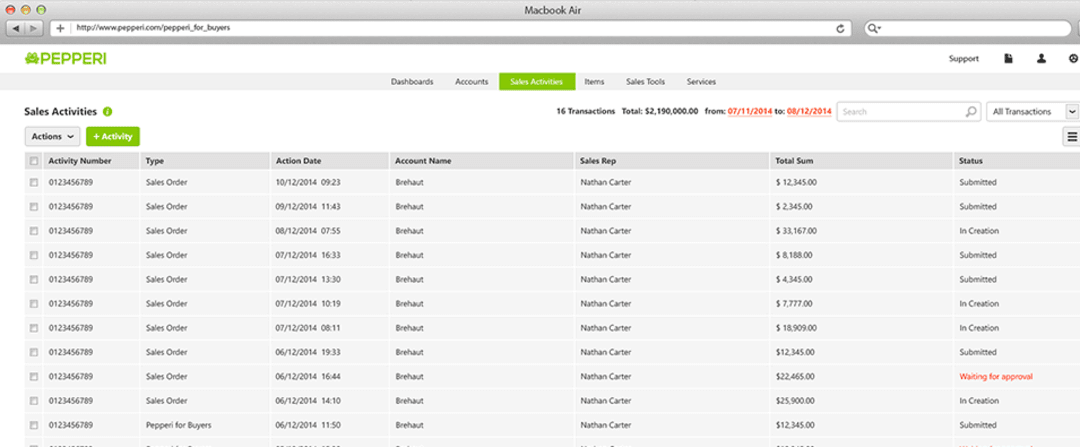
Pepperi B2B Commerce is a platform geared towards brands and wholesalers looking to streamline their B2B sales processes. It provides tools for order tracking, merchandising, and catalog management.
- Order placement tools empowerment
- Insight into inventory status
- Personalized B2B catalog
- Integration with CRM and ERP systems
- Sales-friendly solution tailored for on-the-go transactions
- Emphasis on enhancing visual merchandising and presentation
- Inclusive set of tools for effectively managing sales representatives
- Potential necessity for integrating with existing eCommerce platforms
- Lack of immediate accessibility to pricing details
Pricing
- Pro: starting at $500/month
- Corporate: starting at $1500/month
- Ultimate: contact with Pepperi’s sales team
5. Magento
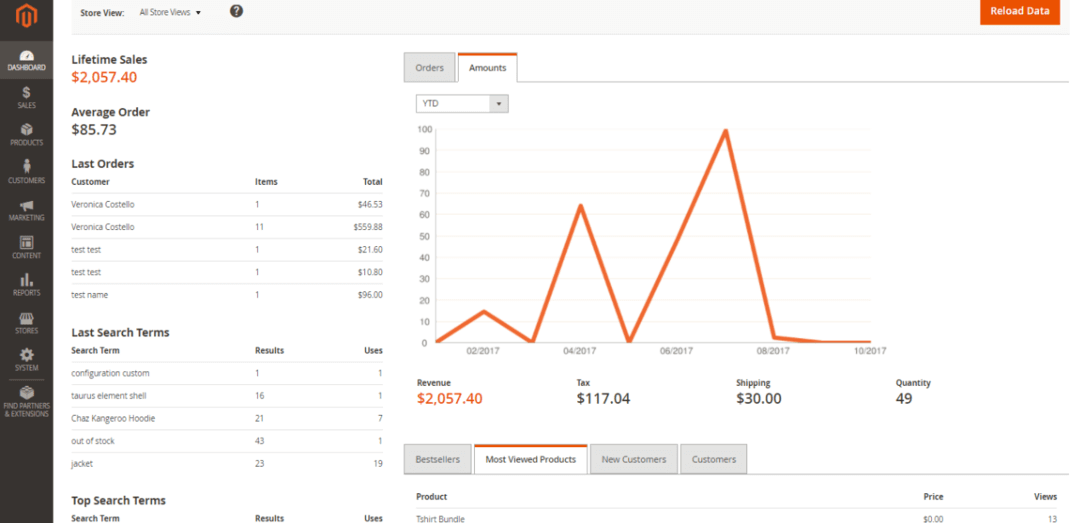
Magento Commerce is an open-source platform that offers flexibility and customization for businesses seeking a tailored B2B eCommerce solution. It empowers businesses to create unique online shopping experiences.
- Set different prices and give discounts
- Advanced B2B account handling
- Wide range of products
- Integrate with tools from different sources
- The platform can be customized a lot to match specific needs.
- Engaging various Magento development and integration services to incorporate extra features
- Can scale to handle big companies
- Might be harder, needing special technical knowledge
- Expenses might increase when adding customizations and extra features
Pricing
- For details regarding pricing, please get in touch with Adobe Commerce.
- Each platform presents a unique blend of features, advantages, and considerations. The choice depends on your business's specific needs, scalability goals, technical capabilities, and budgetary constraints.
Challenges in B2B eCommerce Software
B2B eCommerce software serves as a critical tool for businesses engaged in online transactions with other businesses. However, adopting and utilizing this software can present various challenges that organizations need to address to ensure smooth operations and growth. Some of these challenges include
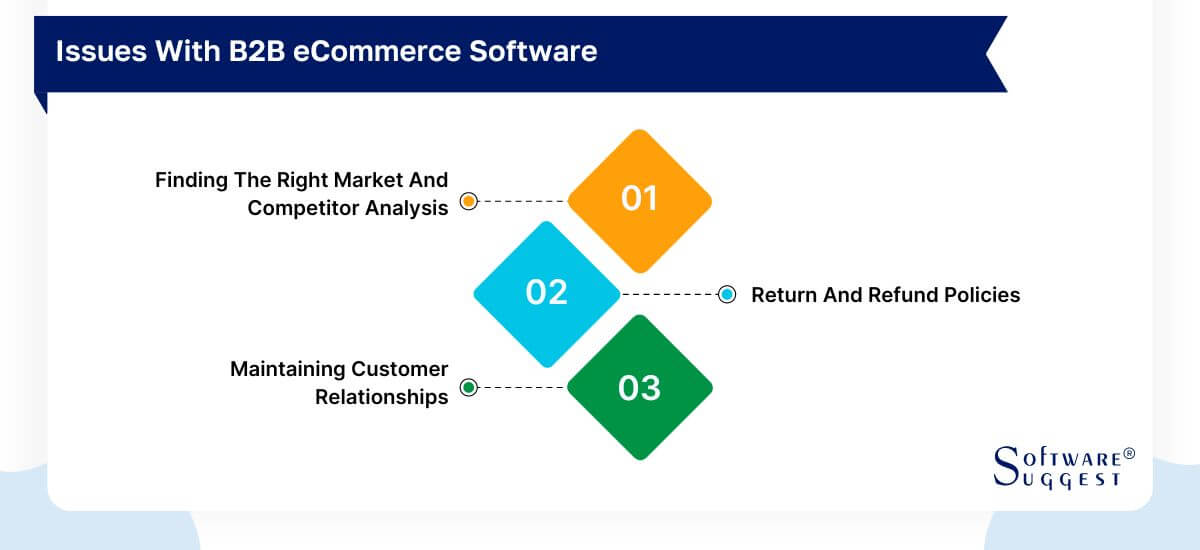
-
Finding the Right Market and Competitor Analysis
Identifying the right market and conducting a thorough competitor analysis is crucial for B2B eCommerce success. However, this process can be challenging. Businesses must navigate through a multitude of factors, such as varying customer preferences and industry-specific demands, to pinpoint their target market accurately.
To tackle these challenges, organizations should invest in comprehensive market research, data analytics, and competitor tracking tools to make informed decisions and remain competitive.
-
Return and Refund Policies
Developing B2B eCommerce return policies is crucial for upholding trust and satisfaction. However, balancing customer needs with business protection is complex. B2B returns involve more intricate factors due to larger quantities and complex products. Crafting clear, fair, and transparent policies tailored to B2B clients demands thoughtful effort. Close alignment with legal and customer service teams ensures compliance and customer satisfaction.
-
Maintaining Customer Relationships
In B2B eCommerce, building and sustaining strong customer relationships is essential. However, maintaining personalized and meaningful relationships in a digital environment can be challenging. B2B transactions often involve multiple decision-makers, and businesses must ensure consistent communication and engagement throughout the buying journey.
By acknowledging and tackling these obstacles, companies engaged in the B2B eCommerce industry can formulate successful approaches to streamline their activities, elevate customer contentment, and foster expansion.
Approaches could encompass utilizing sophisticated market analysis tools, enhancing return and refund protocols through cooperative efforts, and implementing CRM systems to uphold strong customer connections.
Latest Trends in B2B eCommerce Platforms
B2B eCommerce platforms have witnessed a transformative shift in recent times, adapting to the changing landscape of digital business transactions. As businesses strive to enhance their online presence and streamline operations, several trends have emerged to reshape the B2B eCommerce experience. Four noteworthy trends within this sphere include
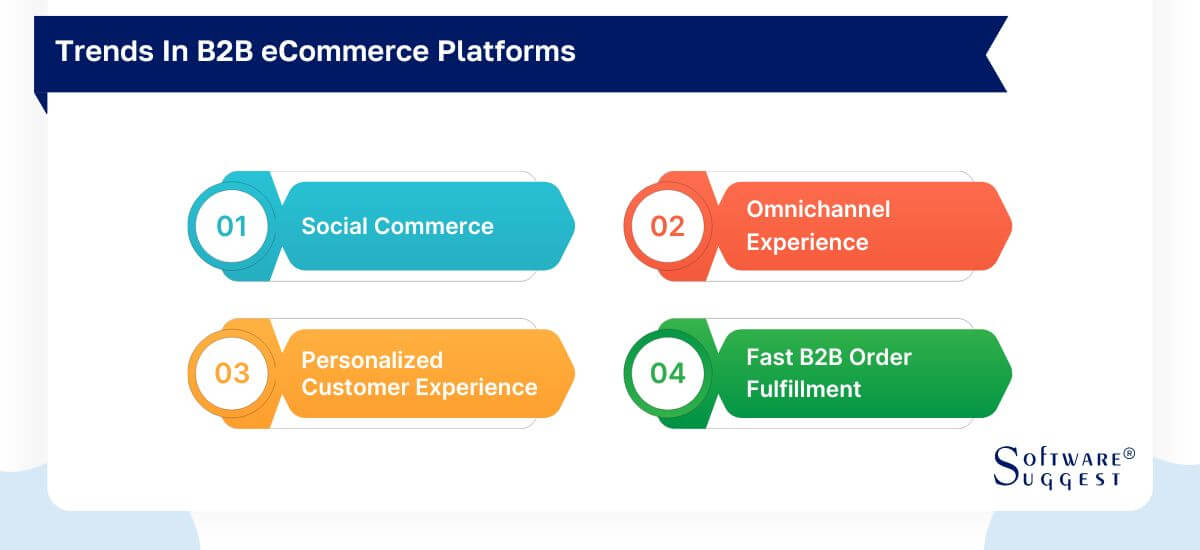
-
Social Commerce
Incorporating social commerce into B2B eCommerce platforms has gained significant traction. Leveraging the power of social media networks, businesses are now able to create seamless shopping experiences for their B2B customers. By integrating B2B eCommerce functionalities into social platforms, companies can facilitate product discovery, seamless purchasing, and personalized recommendations. This trend capitalizes on the social nature of business interactions, enabling users to engage with products and services within their professional networks.
-
Omnichannel Experience
The omnichannel experience has become paramount in B2B eCommerce. Modern buyers expect a cohesive and consistent purchasing journey across various touchpoints, whether it's through websites, mobile apps, or physical locations. B2B eCommerce platforms are embracing this trend by optimizing their systems to provide synchronized and integrated experiences. This involves real-time inventory visibility, unified customer profiles, and synchronized order management, ensuring that customers can seamlessly transition between different channels while maintaining their personalized journey.
-
Personalized Customer Experience
Personalization has evolved from a marketing buzzword to a critical component of B2B eCommerce platforms. Businesses leverage advanced analytics and machine learning to understand customer behavior and preferences. They can offer tailored product recommendations, pricing structures, and content by doing so. This trend enhances customer loyalty, satisfaction, and, ultimately, conversion rates. B2B eCommerce platforms that excel in personalization provide a competitive advantage by catering to the unique needs of individual businesses.
-
Rise in Fast B2B Order Fulfillment
In the fast-paced world of B2B commerce, timely order fulfillment has emerged as a key differentiator. Businesses increasingly demand efficient order processing, rapid shipping, and accurate delivery tracking. B2B eCommerce platforms are responding to this trend by integrating advanced logistics and fulfillment capabilities. Automation, AI-driven demand forecasting, and smart inventory management are being utilized to ensure that orders are processed swiftly and accurately.
The latest trends in B2B eCommerce platforms are driven by the desire to create more seamless, personalized, and efficient experiences for businesses engaging in online transactions. By embracing social commerce integration, enhancing omnichannel experiences, prioritizing personalization, and optimizing order fulfillment, B2B eCommerce platforms are poised to reshape the landscape of digital B2B interactions
Conclusion
B2B eCommerce platforms have transformed the way businesses engage in online transactions. Similar to campaign management software in marketing, these platforms revolutionize B2B interactions by streamlining processes, enhancing customer experiences, and optimizing operations.
Shopify, BigCommerce, Orocommerce, Pepperi and Magento are one of the best in the eCommerce realm. They cater to manufacturers, wholesalers, distributors, and retailers, offering personalized catalog management, efficient order processing, and improved data analysis. Despite the benefits, challenges like market identification and return policies require careful consideration.
Embracing the latest trends, such as social commerce integration, omnichannel experiences, personalization, and rapid order fulfillment, is essential for staying competitive. B2B eCommerce solutions are no longer optional but critical for businesses aiming to succeed in the digital age.
FAQs
The cost of a B2B eCommerce platform can vary widely based on factors such as features, customization, scalability, and provider. It is important to note that fixed pricing is not typically offered by most providers, making it crucial to reach out to them directly to obtain tailored pricing based on your requirements.
Basic solutions might start around a few thousand dollars, while more complex or tailored platforms could range from tens of thousands to potentially over a hundred thousand dollars. It's recommended to get quotes from different providers to find the best fit for your specific needs.
Numerous software options can integrate with B2B Commerce platforms. The best choice depends on your specific business needs and preferences. Here are some common types of software that can integrate with B2B commerce platforms:
- Enterprise Resource Planning (ERP) Systems
- Customer Relationship Management (CRM) Software
- Marketing Automation Tools
- Payment Gateways
- Supply Chain Management Software
B2B (business-to-business) eCommerce involves transactions between businesses, where one business sells products or services to another business. B2C (business-to-consumer) eCommerce, on the other hand, involves transactions between a business and individual consumers, where products or services are sold directly to end-users. The main distinction between B2B and B2C eCommerce lies in the target audience and the nature of the transactions.
By Countries




















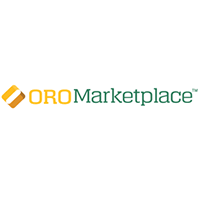



.png)